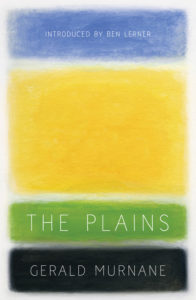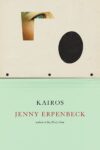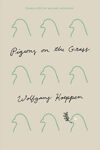 [Text Publishing; 2017]
[Text Publishing; 2017]
“My sentences are the best-shaped of any sentences written by any writer of fiction in the English language during my lifetime,” Gerald Murnane wrote in a typewritten interview to 3:AM Magazine’s Tristan Foster. There now seems no other way to begin a review of his work. The next line, with a clarifying and comic, faux-generous flourish, doubled down on the first’s premise. “The previous sentence is a fair average sample of my prose.”
What is it about that sentence? The clear, comma-less symmetry, the softly elegant, hyphened centerpiece, the opening possessive that in itself becomes funnier the further the sentence extends, amounting to the absurd pride of the property owner, clearing the neighborhood from his lawn – but even more prominent is the unity of form and content, and its impish disunity in the following line. The sentence stretches and the stakes raise, a careful qualifying act that concretizes its claim. But with the next line the particularizing impulse turns into obscurantist comedy. The sentence, epic in its inflation, boils down to a colloquial toss of the hand: “a fair average sample.” And behind the boast and the form, the inflation and shrug, lies a more fundamental question. Who is Gerald Murnane?
Widely regarded as Australia’s greatest living writer, Murnane has long cultivated an air of myth and geographical limit. In Australia he’s recognized as a singular, difficult, canonical writer; in America it’s not that he’s a total point of obscurity as much as a quiet cult presence. One could fill a room with a conversation about him, as Michael Hofmann once claimed you couldn’t with one about the German poet Gottfried Benn, but it would be a strange, speculative affair, arranged months in advance, and the room might as well be a table at a restaurant. Much of his myth, too, lies in a different sense of geographical limit. “I have for long believed that a person reveals at least as much when he reports what he cannot do or has never done as when he reports what he has done or wants to do,” Murnane said in a lecture at the University of Newcastle in 2001, before coming out with the negative revelation most revealing about himself: “I have never been in an aeroplane.”
That confession has now acquired, in Murnane circles, the dull status of the thing everyone knows. As a character quirk, however, it hardly stands alone. Ever since the 2001 lecture, Murnane’s list of personal eccentricities, each item hesitating somewhere in a matrix of habit, fate, and philosophy, has accrued into an almost parallel pole of attraction, beguiling to gossipy minds like my own, and apparently Murnane’s – “Much of my engagement with a text,” he explained, “consists of my speculating about the methods used by the writer in the putting together of the text, or about the feelings and beliefs that drove the writer to write the text, or even about the life story of the writer.” Fittingly – and surprisingly so, for a writer renowned for his privacy – he is now the type of writer for which reading his work and half-grinning over the oddity of his biography go hand in hand. He can’t smell. (He can barely taste.) His father, a horserace enthusiast, named him after a famously disappointing racehorse. He has never “voluntarily” entered an art museum or immersed himself in the sea. He claims to have read Terry Eagleton’s Literary Theory: An Introduction but to have no recollection of the experience. He has never worn sunglasses, owned a television, or used a computer. He can’t quite grasp how currency rates fluctuate, “much less how anyone can profit from this phenomenon.” Streets not arranged on a grid distress him and leave him mute, sometimes to the point where the experience of finding himself on a road winding or slanted troubles him for years afterward. He brews his own beer, twice as strong as what the stores sell, and begins to drink each day in the afternoon and continuing through the evening, in his quiet home in Western Victoria. He doesn’t socialize. He hates popular music, cinema (“I have had much trouble in following the story lines”), and the theater, and doesn’t understand why someone would look to the theater for the drama of emotion, with its “exaggerated facial expressions, the excessive gestures, and the frank speech of the characters,” when you could go to a horserace (“there may be some reader who needs to be told that I have got from horse-racing during my lifetime more meaning than I have got from literature or music or any other branch of what is generally called culture”). He is “competent, to varying extents, in six languages,” including French, Latin, Maltese, Hungarian (which he taught himself, at 56), and Arabic. And he’s never been outside a 1000-mile by 1000-mile square in southeast Australia.
Each revelation lets in light, in its way, on Murnane’s work, but none has a claim to illuminating his most celebrated book as convincingly as his geographical stillness. The Plains, first published in 1982, and now reissued as a Ben Lerner-introduced “classic” by the Melbourne publisher Text Editions, begins in a “large town,” “on a certain afternoon,” with its narrator “among the labyrinths of saloon bars and lounges on the ground floor” of the “largest hotel in the town.” Sun slips through the blinds. He has come from Australia’s populous coasts to the plains’ last commercial threshold. Beyond lies an invented inner Australia: purer, boundless, more inward-gazing and uniquely conservative than its actually existing referent, parceled into vast latifundias, punctuated by enormous manors, and presided over by a set of aristocrat-intellectuals, slight anachronisms and full confabulations, who spend their days in hushed, masonic contemplation of the endless vistas outside their sun-bathed windows. The aristocrat-intellectuals have come to town to settle business and occupy the bar’s backroom; upfront the narrator waits with a list of fellow hopefuls, artists and cultural historians the landowners summon to the backroom one by one to beg patronage for their various projects.
The narrator’s summons is the first of two feinted climaxes. It’s a book in which what feels like a whole productive life goes by, and not much happens. Scenes are rare, but an equivalent effect predominates, passages describing wide tranches of yawning days as if they had the visual fullness of a moment. “None of the scholars I mention can guess how many successive encroachments of afternoon sunlight on the shadowy corners of libraries will have bleached the glossy inks on the books that they open at last” – this is the line Lerner highlights. He calls Murnane’s sentences “little dialectics of boredom and beauty, flatness and depth,” and the gloss does a lot to sum up the style – something poetic and elaborate poised against intellectual concision. In the absence of scene, ideas take over – invented bibliographies, doctrinal disputes, theories of time, schools of mapmaking – but always with a physical backdrop, an illuminated library row or looming landscape. The narrator, growing steadily drunker as he awaits his turn in front of the landowners, thinks back on what he’s learned of the plains. The trick to impress a patron is to play favorably into the plainsman’s paradoxical cast of mind. Willfully isolated in the depths of Australia, the plainsmen build up defenses against the fashionable ideas of the metropolitan coasts, preserving their pristine feudal culture of patriarchy and landscaped irony, pretending to know nothing of outside. What forms the book’s core, then, is an inquiry into the canons of an invented insular intellectual tradition – a book that, like the short works of Borges (to reach for the obvious example), fictionalizes scholarship.
And so we learn of two opposed traditions, the Horizonites and the Haremen, minor artistic avant-gardes of vaguely idealist and materialist persuasions – dressed, contrastingly, in blue-green and dull-gold ribbons – who focus their attention on either the plains’ horizon or their immediate appearance. Trivial at first (“of interest to no one but a few diehards hunched over acrid wines in back bars or haranguing casual acquaintances at opening nights in inferior art galleries”), after a spell of years the avant-gardes acquire political correspondences, split into the fantasies of imperialism and the practicalities of nationalism. Eventually the schools vanish, but only to take up a more permanent, opaque residence in the memories and disguised theories of the landowners. For his part, the narrator hopes to make a film that reconciles this rupture in the plains’ intellectual landscape. He is called to the backroom and left unaddressed for half an hour, sitting silently as loud, drunken debate swirls. Once he takes the floor, he seems only to have the full attention of one landowner, who at the end of the speech throws down his glass and climbs into a stretcher, hands shielding his eyes. He lets out a faint whisper: the idea is “outrageous,” tainted by a “young man’s eagerness to look at simple coloured images,” but “perhaps, young and blind” as the narrator is, he should present himself at the landowner’s “county seat at sundown the following day.”
He assumes a position in the house. The rest of the book unfolds in the curious temporality mentioned earlier, decades filtered into a sweep of afternoons. (The second half-climax occurs when the narrator, burrowed away in the library, devises a series of plans to communicate with the landowner’s wife, who also returns daily to the library, and with whom he divines a sense of sympathy. His first plan is to write an essay collection about their shared sympathy and place it on a shelf she often looks to; the second, to write the book but release it only to a select group of reviewers; the third, to give a copy to the estate’s librarians, but then steal it from the shelf and destroy it; the fourth, to never write the book but detail its contents in the library catalogue; and finally, to do nothing at all.) His project carries on, but with little hope of amounting to anything. He no longer wants to make a film – but he owes his reputation to his supposed stubborn persistence in carrying on with an art form so obviously inadequate to the plains. The plains cannot be vulgarized by the literalism of visual culture, for “they are simply a convenient source of metaphors for those who know that men invent their own meanings.” Each year the narrator presents his research on the plains in blind-drawn rooms, his speech culminating in a dramatic flinging open of the curtains to reveal the landscape anew – and each year fewer attend. The book’s end meditates on the landowner’s penchant for fabricating “scenes” – day trips to distant corners of the estate at which the landowner wanders around with his despised camera, stage-directing guests into tableaux. He always asks the narrator to pose the same way: camera in hand, his face serious and comprehending, recording with mocked futility the mere sight that anyone can see.
It seems rarely said that Murnane might be above all a comedian, though the sense of a stoic comedy, to steal Hugh Kenner’s phrase, or even of an accidental one, can’t be incidental to his growing reputation. There is something outlandish about the way his anti-predilections, laid out in peculiar form in his 2001 lecture, map so neatly onto novelistic features one would want to think of as more than literary illuminations of profane judgments. Some of the lecture’s confessions, to be sure, express themselves elegantly in Murnane’s work: “one gets the sense that Murnane’s insularity,” Sarah Gerard wrote in a review of Something for the Pain, Murnane’s 2015 memoir, “has simply mitigated disruption of his dream-world from outside influences, in a sense preserving it.” But other revelations seem just amusing, in a crude sense. “I have watched few films during my lifetime and hardly any in recent years. Throughout my life, I have had much trouble in following the story lines of films and making the necessary connections between the rapidly changing images.” Is The Plains – with its filmmaker-narrator, thrown into a film-averse culture, whose bildungsroman journey is really a process of disenchantment with film – a polemic against visual culture rooted in its author’s cluelessness, even his philistinism, in the face of cinema?
I confess to not knowing what to do with Murnane’s public persona, on the rare occasions it surfaces. Is he serious? Does he mean to be funny? Was the lecture a trail of mock-clues for vulgar critics, or something generously in earnest? A paradox pervades his interviews. He seems motivated by a need to demystify: “Remember, too,” he told Tristan Foster, “apart from my struggle to appeal to publishers, I was nearly always a part-time writer with a full-time job and a wife and children around me. All I can say is that I wrote as well as I could about what mattered most to me at the time and when I could find a few spare hours.” And yet for all the apparent openness, one still discerns distance, myth, and the maintenance of a screen behind which one will never peer. An obvious simplicity (“Most of my books were hard to write,” he told Teju Cole) sits next to alluring references to his archives (“a whole new body of writing to be taken account of”) or long answers given in parable. And behind his statements lurks a perennial threat of hardly concealed violence, the curmudgeonly guard sealing the border: “persons such as yourself,” he sneered to Foster, or “The question arouses a mild resentfulness in me,” or “I’m tired of your question after question,” or “Here’s a smart-arse answer,” or, in a different vein, “I have no time for those writers of fiction who find their subject matter in the news headlines; who turn the so-called issues of the day into fiction.” I imagine if he read Freud’s theory of art he would recall nothing of it, but he might very well be staring himself in the face – a bourgeois artist par excellence. Doubtless he would loathe that now musty-sounding epithet. Luckily, Teju Cole appended a more suitable one, now adorning the back of his classic: “Murnane, a genius.”
William Harris is a columnist for Full Stop who has also written for the Los Angeles Review of Books, 3:AM, and The Point. He lives in Minneapolis.
This post may contain affiliate links.







